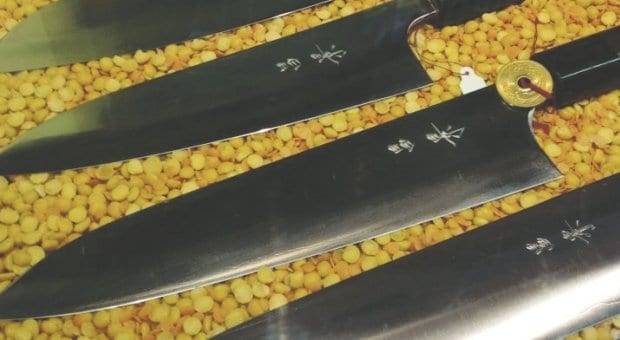A good knife is like a luxury car: a tool that serves a practical purpose but is also about design, aesthetics and the experience of using something made with care and precision. According to the staff at Knifewear, a Calgary-based specialty knife store that just opened its first Ottawa location, a well-made knife is of paramount importance for anyone with a kitchen.
Knifewear got its beginnings in 2007 when owner Kevin Kent set up shop in Calgary after finding nowhere to buy precision Japanese chefs’ knives in Canada. The Ottawa store opened its doors in July. “We’ve had a huge welcome here, and it’s been a really interesting spot to put the store in the Glebe with all the different foodies and stuff that are here,” says Ottawa manager Heather Erven. “It’s not just chefs that we see coming into the store; it’s everybody from the community.”
The shop has an open concept, with striking red walls and cases of knives on full display, resting gently in their beds of red lentils. Staff members are all incredibly knowledgeable about their wares and the materials used to make them. “One of the big differences that people don’t really know about knives is the hardness of the steel,” says Michael Wrinch, who manages the Calgary store. “Japanese knives are much harder than many other knives you find on the market. This is the basis of why we like them so much — the hardness in the metal allows them to stay sharper for a much longer time.”
Customers are encouraged to try out the knives by slicing through potatoes. “It’s more like cutting your food with a razor and less like cutting your food with an axe,” Wrinch says, explaining that part of the importance of using good-quality knives has to do with the food itself. “To me it’s a way of showing respect for the people that have grown the food to treat it properly and to not just smash it up and break it down.”
Most of the knives in the store are made out of carbon steel, which, Erven explains, is the acme of knife materials. Proper care is especially important but also fairly simple: “Just wipe it down and dry it after,” she advises. Using a wood or plastic cutting surface can also extend a knife’s lifespan. Knifewear carries a huge range of knife shapes and styles, ranging from the simplest paring knives to the ubiquitous santoku — and high-end sushi blades such as the deba and usuba. The weight and balance of a knife is extremely important; it should settle in your hand in such a way that the blade itself does most of the work. “[Something] you want to look for when you’re buying a knife is somewhere that’s going to maintain the knives,” Erven says. “We offer knife-sharpening services here, so we specialize in making sure that all of our customers have a sharp knife forever.”
The store also knows which Japanese blacksmith made each blade; many belong to families that have been making knives for hundreds of years. “It’s pretty remarkable the history that they come from,” Erven says.
It’s obvious that the folks at Knifewear are incredibly passionate about what they do. “These things are gorgeous, they’re sexy, they can be inspiring to you to cook better food,” Wrinch says. “They’re amazing.”
Knifewear Ottawa
800 Bank St
knifewear.com


 Why you can trust Xtra
Why you can trust Xtra


